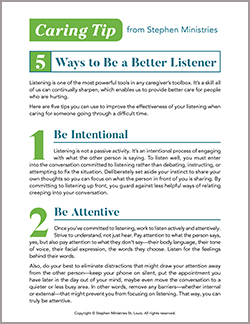

Listening is one of the most powerful tools in any caregiver’s toolbox. It’s a skill all of us can continually sharpen, which enables us to provide better care for people who are hurting. Here are five tips you can use to improve the effectiveness of your listening when caring for someone going through a difficult time.
1. Be Intentional
Listening is not a passive activity. It’s an intentional process of engaging with what the other person is saying. To listen well, you must enter into the conversation committed to listening rather than debating, instructing, or attempting to fix the situation. Deliberately set aside your instinct to share your own thoughts so you can focus on what the person in front of you is sharing. By committing to listening up front, you guard against less helpful ways of relating creeping into your conversation.
2. Be Attentive
Once you’ve committed to listening, work to listen actively and attentively. Strive to understand, not just hear. Pay attention to what the person says, yes, but also pay attention to what they don’t say—their body language, their tone of voice, their facial expression, the words they choose. Listen for the feelings behind their words.
Also, do your best to eliminate distractions that might draw your attention away from the other person—keep your phone on silent, put the appointment you have later in the day out of your mind, maybe even move the conversation to a quieter or less busy area. In other words, remove any barriers—whether internal or external—that might prevent you from focusing on listening. That way, you can truly be attentive.
3. Be Responsive
Letting the person you’re talking to know that you’re attentively listening is key to helping them feel cared for and encouraging them to continue sharing. The best way to do this is to be responsive to what they say. Some easy ways to communicate your attentive listening are maintaining eye contact, using nonverbal cues like nodding, and offering brief responses like “Mm-hmm.”

For additional ideas on how to best offer care and support, check out the book Don't Sing Songs to a Heavy Heart: How to Relate to Those Who Are Suffering.
You can learn more about the book at stephenministries.org/DSS.
Asking questions is another great technique to use. So is reflecting what the person says—expressing in your own words your understanding of what they’ve just told you. For example, if someone says, “I can’t believe they would do that to me!” you might respond, “It sounds like you’re very upset with them.” Short responses like these show that you’re truly engaged in the conversation.
4. Be Non-Judgmental
Nothing shuts down a hurting person’s sharing faster than feeling judged, so take care to avoid coming across as judgmental. Relate in an open, accepting manner and watch out for any behaviors or words that could inadvertently communicate judgment—facial expressions that suggest shock or disagreement, gasping, crossing your arms, or asking questions that begin with “Why?”
As much as possible, avoid knee-jerk reactions and stay calm and encouraging. The more composed and non-judgmental you are in your responses, the safer the other person will feel.
5. Be Trustworthy
It’s rare for any of us to express our deepest thoughts and feelings without assurance that what we say will stay between us and the person we’re talking with. Letting a hurting person know that you’ll keep what they share with you in confidence establishes a foundation of trust that facilitates sharing. You might briefly mention at the beginning and end of the conversation that you won’t share anything the other person tells you. You don’t have to overstate it—just a short reminder can be a real comfort.
Holding what the person says in confidence honors the trust placed in you, and as a result, that individual is likely to see you as a safe person to talk to. This keeps the door open for additional caring conversations in the future.
Consistently putting these five tips into practice will have a big impact on the effectiveness of your listening. As you continue to hone your listening skills, people you relate to will come away from conversations with you feeling heard, understood, and cared for.

